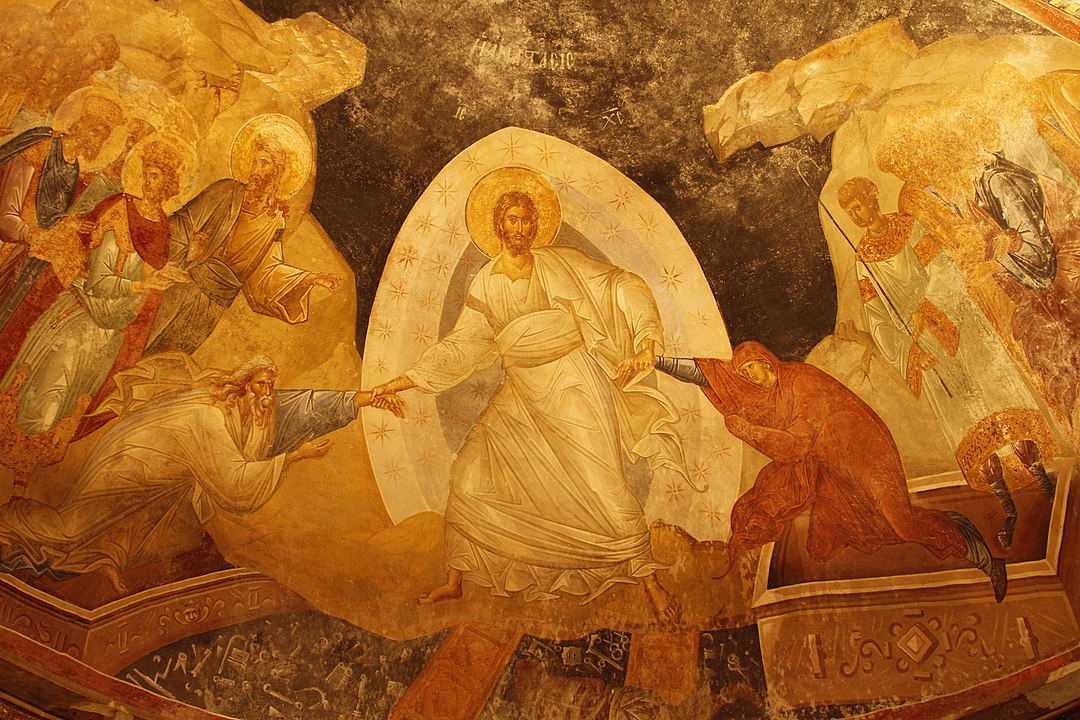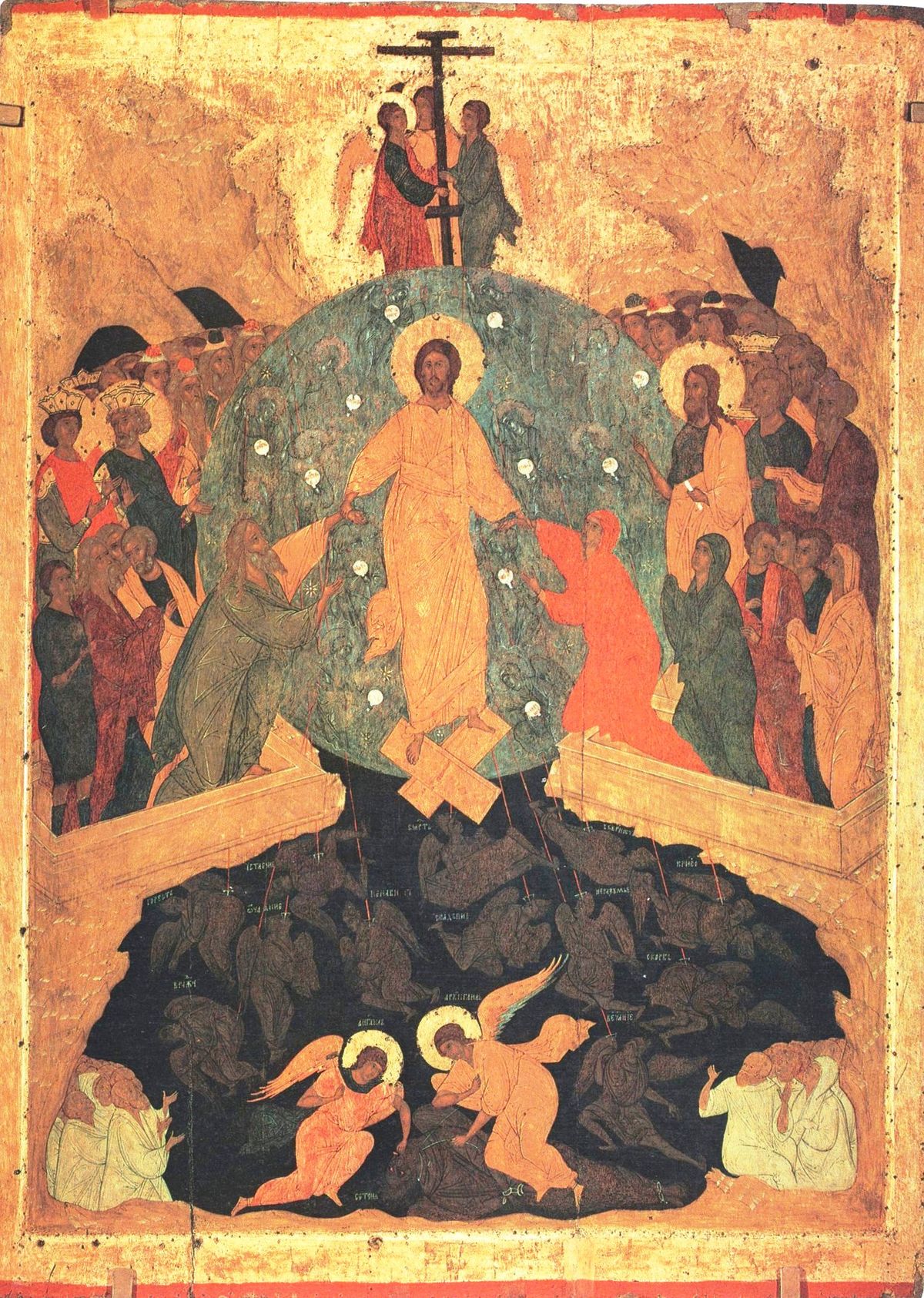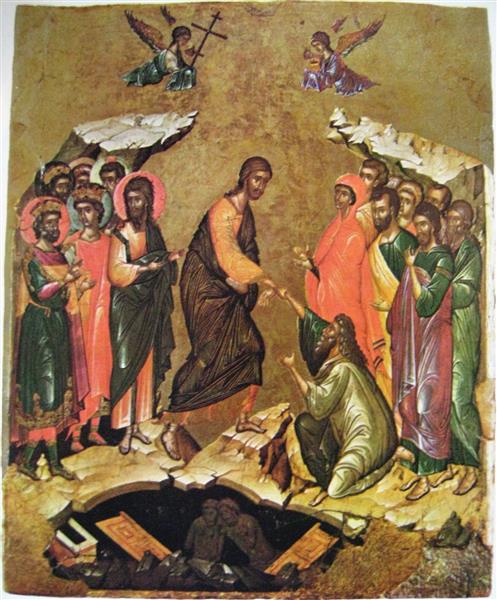"When I saw him, I fell at his feet as though dead. But he laid his right hand on me, saying, “Fear not, I am the first and the last, and the living one. I died, and behold I am alive forevermore, and I have the keys of Death and Hades" ~ Revelations 1:17-18
What Is the Harrowing of Hell?
Jesus' descent into the place of the dead is referred to in the Apostles' Creed and the Athanasian Creed, which state that Jesus "descended into the underworld." His descent to the underworld is mentioned in the New Testament in 1 Peter 4:6, which states that the "gospel was preached even to those who are now dead" (see below). The Catholic Catechism interprets Ephesians 4:9, which states that "[Christ] descended into the lower parts of the earth," as also supporting this interpretation. The Harrowing of Hell is commemorated in the liturgical calendar on Holy Saturday.
According to the apocryphal Gospel of Nicodemus, the Harrowing of Hell was foreshadowed by Christ's raising of Lazarus from the dead preceding his own crucifixion. The hymns of Easter weekend mention that as he did on earth, John the Baptist prepared the way for Jesus in Hell by prophesying to the spirits held there that Christ would soon save them.
The Descent of Christ into Hades in 1 Peter
"For it is better, if it is God’s will, to suffer for doing good than for doing evil. For Christ also suffered once for sins, the righteous for the unrighteous, to bring you to God. He was put to death in the body but made alive in the Spirit. After being made alive, he went and made proclamation to the imprisoned spirits— to those who were disobedient long ago when God waited patiently in the days of Noah while the ark was being built. In it only a few people, eight in all, were saved through water, and this water symbolizes baptism that now saves you also—not the removal of dirt from the body but the pledge of a clear conscience toward God. It saves you by the resurrection of Jesus Christ, who has gone into heaven and is at God’s right hand—with angels, authorities and powers in submission to him." ~ 1 Peter 3:17-22 (Emphasis added)
"For this is the reason the gospel was preached even to those who are now dead, so that they might be judged according to human standards in regard to the body, but live according to God in regard to the spirit." ~ 1 Peter 4:6 (Emphasis added)

Late Byzantine fresco of the Harrowing of Hell, in the Chora Church in Constantinople (modern Istanbul).
C.S. Lewis on the Harrowing of Hell
In his letter to Mrs. Sutherford, CS Lewis gives his perspective on the descent of Christ into hades to proclaim the Gospel to those who lived before His incarnation:
“I believe in something like this,” Lewis explains to Mrs. Sutherland. We understand that Jesus did go to hell to preach to those who came before the cross. We understand that he saved some of them and brought them to heaven with him.
“The medieval authors,” says Lewis, “delighted to picture what they called ‘the harrowing of hell’, Christ descending and knocking on those eternal doors and bringing out those who He chose…. That would explain how what Christ did can save those who lived long before the Incarnation.”
Did Jesus Christ Descend into Hell Before His Resurrection?
I remember growing up, even though I was a non-Christian I grew up in a church, and sometimes they would read the Apostle's Creed. And there's a later addition to the Apostle's Creed that says, "And he descended into hell." And I always wondered about that. And then after I became a Christian, that was one of my first questions, and began reading through the scriptures. And you've got this place in 1 Peter chapter 3.
It speaks about Christ that after his death, that he was made alive in the Spirit verse 18. Then verse 19 in which he went and proclaimed to the spirits in prison. And then he goes on to talk about that these spirits who are in prison, that they disobeyed the days of Noah.
And I was like, "What in the world does that mean?" And what appears to happen is that when Christ died on the cross, we always wonder well, what happened those three days where he was? Well, his body it says it was in the tomb and his spirit evidently descended to Hades or the place of the dead. I don't think it's right to call it hell. Hell appears to be something that's coming later.
Hell isn't something that's now. Hell is the lake of fire that will one day come. So Hades is the place of the dead. And apparently according to 1 Peter and also in Jude. You see it in 2 Peter as well, there were some angels who did something bad in the days of Noah and they got resigned to a place.
If you remember during Jesus's ministry, he's casting out some demons and they say, "Don't send us to that place. Put us in the pigs instead." There's a place that the demons knew about that they didn't want to go to. Well, it appears that that's where Jesus went during that time. And he proclaimed victory that he had through his death and the resurrection that was about to happen.
That he had defeated sin, Satan, and death, and that their condemnation was going to be certain. And then on the third day after his crucifixion, he rose from the dead. Now there are some preachers today who will say that He descended into hell and there he received all this different stuff.
And that's just not in the Bible at all. It appears that what happened was He went into that place and He proclaimed the gospel in the sense that this is what has happened. Judgment is now certain.
Artwork Depicting the Harrowing of Hell
An icon representing Christ's Harrowing of Hell by Dionisios from the Ferapontov Monastery.

Byzantine icon of the Harrowing of Hell, dated 1450.

Photo credit: ©Getty Images/artisteer
Christianity.com's editorial staff is a team of writers with a background in the Christian faith and writing experience. We work to create relevant, inspiring content for our audience and update timely articles as necessary.



